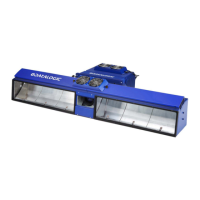AV7000 LINEAR CAMERA REFERENCE MANUAL
Internal Tach: This is a software-generated pulse mimicking an encoder/tachometer.
PGD100 Speed Detector: Used with tilt-tray or cross-belt sorters. This detector uses a
series of photoelectric sensors to determine the conveyor speed.
The position sensor (DM3610, RangeFinder, or light curtain (DS2)) is often used as a trigger
source. When the height or left/right focus data measured by the sensor goes over a certain
threshold, then a package is entering the image valid start, and when it goes under the
threshold, the package is providing the image valid stop. Sometimes this sensor is not
sufficiently precise and an additional "Presence Sensor" (AS1 or photoelectric sensor) input
is used. An additional photoelectric sensor or conveyor controller signal is usually connected
to this input.
When the codes are on more than one face of the parcel, more than one barcode reader-
illuminator pair is necessary (multi-camera reading station). In this case, one of the barcode
readers (the "Master") collects the information from all the sensors and distributes it to the
other barcode readers using a dedicated ethernet connection.
A CBX connection box can be used to simplify the connection of the camera to the other
system components (photoelectric sensors, encoders, height sensors, and etc.).
A typical reading station will also include:
Power Supply Systems: The AV7000 requires a 24 Vdc power supply. Usually each
barcode reader-illuminator pair has its own power supply system (i. e. PWR-480B).
Connection Boxes: CBX100, CBX500, CBX510, or CBX800
Height/Side Position Sensor: RangeFinder, DM3610, or light curtain
External Deflection Mirrors: To cover the requested reading field, the cameras must be
positioned at a given distance from their targets. In order to create reading stations as
small as possible, a deflection mirror is often inserted between the target and the barcode
reader.
Figure 5: Typical Reading Station with RangeFinder (left) and DM3610 (right)

